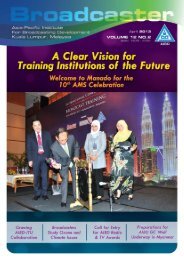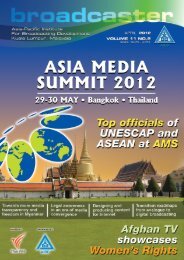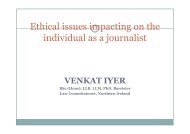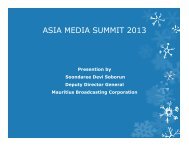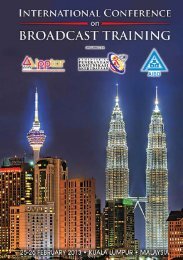SUMMIT
New Visions Asia Media Summit 2008 - AIBD
New Visions Asia Media Summit 2008 - AIBD
- No tags were found...
You also want an ePaper? Increase the reach of your titles
YUMPU automatically turns print PDFs into web optimized ePapers that Google loves.
Social Responsibility<br />
Abdul Rahman Abdul Aziz Al hazaa'<br />
In recent mes, mass media has developed its ways and administraons; its role is no<br />
longer limited to news and entertainment; it goes beyond other contents.<br />
Today, mass media has become an effecve tool in creang public opinion and affecng<br />
society’s culture. Individuals react and are affected mentally and behaviorally by what<br />
they watch, hear, or read. Its influence has gone beyond the naonal level, enabling the<br />
world to become one village.<br />
Hence, media professionals assume a big responsibility; so do public and private investors<br />
who must take into consideraon the demands and aspiraons of the audiences.<br />
Sociees especially in the developing countries enjoin mass media to be more transparent<br />
and pursue posive iniaves to make its ambions, expressing opinions within the<br />
bounds of law. Individuals have a right to get acquainted with the culture around them,<br />
and with the various media messages they receive daily.<br />
To achieve these challenges, media men must consider the following: concern for various<br />
issues in a society; exposure to all opinions and atudes between the supporter and the<br />
opponent, in complete freedom and equilibrium; opportunies for individuals to express<br />
what they want; and pursuit of mass media as a bridge between the broad audience and<br />
the officials (leaders).<br />
Now the queson is : Are media men and the investors able to do that?<br />
The answer is : (NO) because of several concerns like: -<br />
First: the big gap between the developed and developing countries<br />
in the information field<br />
It's crystal clear there's a big gap between the developed and developing countries; the<br />
former has the informaon and ways of disseminaon; they can control the quality and<br />
quanty according to their goals. The laer that oen represents the informaon receiver<br />
does not have any choice in determining its contents or goals. The one-way huge informa-<br />
on flow creates extreme danger to society’s idenficaon and values in the developing<br />
countries, and put their governmental local and private mass media in front of a big<br />
challenge to face the cultural globalizaon.<br />
It's known to all that the U.S.A, the European naons and some other countries have<br />
invested yearly billions of dollars to transmit their mass media to the other naons<br />
especially in the Middle East, Asia and Africa. The developed countries don't aim to<br />
achieve the financial profit from these investments, but to realize their goals such as<br />
gaining public opinion, improving their reputaon, and aracng more supporters at the<br />
expense of the needs of sociees in these countries.<br />
113



